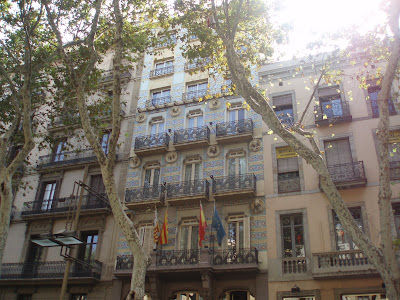Let me start with the positive things, that is with the people we met in the guest house we stayed: a lovely couple from Belgium, the German owners, a newly wed couple - the girl Irish, the boy German -, a very decent English family, but also not in the guest house a Dutch former circus clown that showed us around in a small winery we visited as their public relations man. We also liked a lot the local Penedès wines, even the whites, which until then Imust admit didn't hold in great esteem. In the positive things I must also include Gaudi's city: Barcelona, but in the negatives the thousands of tourists flooding it. We also didn't like the food, which we found overpriced, too - or perhaps we just went to the wrong places. The landscape was another thing we didn't like: destroyed by construction cranes, as the whole of Catalonia seemed to be under construction, cranes and lorries everywhere. Also, in comparison to Italy but also France, Catalonia didn't prove very hospitable, at least as regards the very poor number and variety of agritourist places on offer: we had a really hard time finding internet access and then a place to stay, after twenty long hours of driving from Italy through Southern France to Barcelona.
Sant Martí Sarroca, a village near our guest house.

A church perched on a hilltop near the village.

Details from La Sagrada Família, the cathedral Gaudi didn't have time to finish, in Barcelona. I have a feeling that he wouldn't have liked the vending machines the Spanish put inside, which you have to also pay 8 euros to see. The interior generally seems to be under construction, with not much to see - except the vending machines, of course!


At the famous monastery of Montserrat, near Barcelona.

A small winery in Penedès. The Dutchman who showed us around spoke six languages, traveled through Europe for 2o years as a circus clown where (at a circus) he also met his Italian wife. He came to Spain to meet and train near a famous clown and started working in the Penedès wineries, ending up as the puclic relations man of this one.
 Strolling through Barcelona.
Strolling through Barcelona.

 At the Dali Museum in Figuears near the French border.
At the Dali Museum in Figuears near the French border.

 A counrty house's garden door in Gaudi style, in a village that was a real work of art, near Figueras.
A counrty house's garden door in Gaudi style, in a village that was a real work of art, near Figueras.
 Garraf beach, near Barcelona: summer houses.
Garraf beach, near Barcelona: summer houses.


















